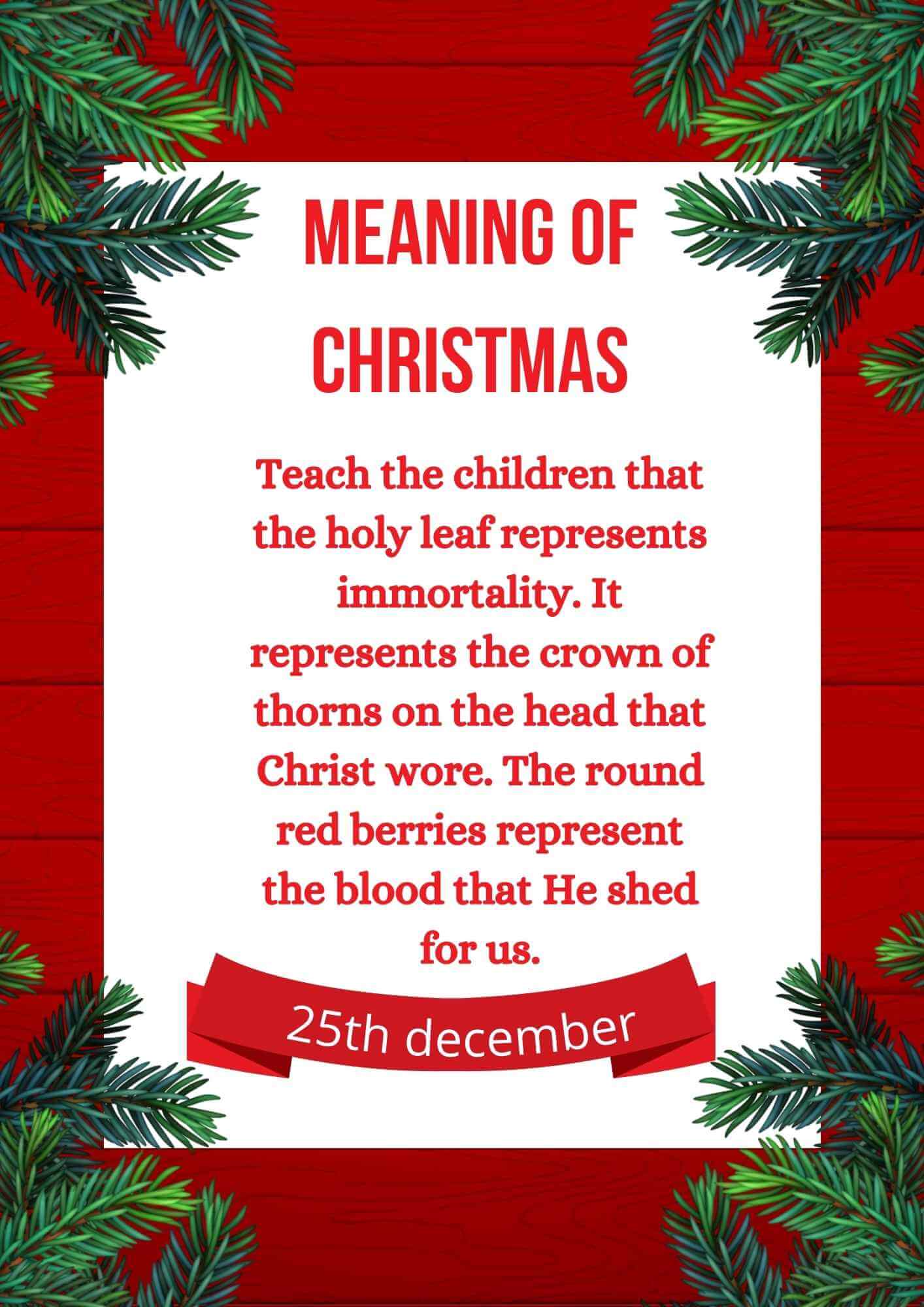Unpacking the Meaning of "Merry Christmas": A Celebration of Tradition, Joy, and Hope
Related Articles: Unpacking the Meaning of "Merry Christmas": A Celebration of Tradition, Joy, and Hope
Introduction
In this auspicious occasion, we are delighted to delve into the intriguing topic related to Unpacking the Meaning of "Merry Christmas": A Celebration of Tradition, Joy, and Hope. Let’s weave interesting information and offer fresh perspectives to the readers.
Table of Content
Unpacking the Meaning of "Merry Christmas": A Celebration of Tradition, Joy, and Hope

The phrase "Merry Christmas" is more than just a holiday greeting. It encapsulates a rich tapestry of cultural traditions, religious beliefs, and deeply held values that have resonated across generations. Understanding its meaning involves delving into the historical context, the evolving significance of the holiday, and its impact on individuals and communities.
Historical Roots and Religious Significance:
The phrase "Merry Christmas" derives from the celebration of the birth of Jesus Christ, a central figure in Christianity. Christmas, as a religious holiday, commemorates the incarnation of God in human form, a pivotal event in Christian theology. The celebration is rooted in the Gospel accounts of the birth of Jesus in Bethlehem, where he was born to the Virgin Mary and Joseph.
While the exact date of Jesus’ birth remains uncertain, the Western Christian Church established December 25th as the official date for Christmas in the 4th century. This date coincided with the Roman festival of Saturnalia, a celebration of winter solstice and the rebirth of the sun. This overlap contributed to the adoption of Christmas as a holiday by the wider Roman population, facilitating its spread across Europe and beyond.
Evolution of Christmas Traditions:
Over the centuries, Christmas evolved from a primarily religious observance to a more secular celebration. The holiday’s association with gift-giving, festive decorations, and family gatherings became increasingly prominent. The exchange of gifts, rooted in the tradition of the three wise men bringing gifts to the newborn Jesus, transformed into a secular practice of expressing love and appreciation among family and friends.
The custom of decorating Christmas trees, a practice originating in Germany, gained widespread popularity. The evergreen tree, symbolizing eternal life, became a visual representation of the celebration, adorned with ornaments, lights, and other decorations. The festive atmosphere created by these traditions further cemented Christmas as a time for joy, togetherness, and merriment.
Cultural and Social Impact:
The impact of Christmas extends beyond religious and cultural boundaries. The holiday has become a global phenomenon, celebrated by individuals and communities of diverse backgrounds. Its unifying spirit transcends cultural differences, fostering a sense of shared celebration and goodwill.
Christmas serves as a time for families to reunite, share meals, and create lasting memories. It is a period of reflection and gratitude, where individuals acknowledge the blessings in their lives and express appreciation for loved ones. The holiday also encourages acts of generosity and compassion, as people engage in charitable endeavors and extend a helping hand to those in need.
Contemporary Significance:
In the modern era, Christmas continues to hold immense significance. While its religious origins remain important for many, the holiday has also evolved to encompass broader themes of hope, peace, and unity. The spirit of Christmas encourages individuals to embrace kindness, forgiveness, and understanding, promoting a sense of community and shared humanity.
The holiday’s commercialization, while controversial, has also contributed to its global reach. The exchange of gifts, festive decorations, and holiday music have become ubiquitous, further solidifying Christmas as a cultural touchstone.
Benefits of Celebrating Christmas:
Celebrating Christmas offers numerous benefits, both personal and societal. It provides opportunities for:
- Strengthening Family Bonds: Christmas reunites families, fostering communication, connection, and shared experiences.
- Promoting Generosity and Compassion: The holiday encourages acts of kindness, supporting charitable initiatives and helping those in need.
- Creating Joy and Happiness: Christmas festivities bring a sense of merriment, joy, and laughter, promoting positive emotions and well-being.
- Cultivating Hope and Optimism: The holiday’s themes of peace, goodwill, and renewal inspire hope and optimism, offering a sense of renewal and possibility.
- Preserving Cultural Traditions: Christmas celebrations preserve cultural heritage and traditions, connecting individuals to their past and creating a sense of continuity.
FAQs about the Meaning of "Merry Christmas":
Q: Is "Merry Christmas" a purely religious greeting?
A: While "Merry Christmas" has religious roots, it has evolved into a more secular greeting, encompassing a broader range of cultural and social meanings.
Q: What are some alternative greetings to "Merry Christmas"?
A: Alternatives include "Happy Holidays," "Season’s Greetings," or simply "Happy Christmas," acknowledging the diverse cultural and religious backgrounds of individuals.
Q: How can I celebrate Christmas meaningfully without being religious?
A: Focus on the secular aspects of the holiday, such as spending time with loved ones, exchanging gifts, enjoying festive meals, and engaging in charitable acts.
Q: What are some tips for making Christmas more meaningful?
A: Prioritize quality time with family and friends, engage in acts of kindness, reflect on the year’s blessings, and focus on the spirit of the holiday.
Q: What is the importance of Christmas in the modern world?
A: Christmas provides an opportunity for individuals and communities to come together, celebrate shared values, and promote goodwill, fostering a sense of unity and hope.
Conclusion:
The meaning of "Merry Christmas" extends far beyond a simple greeting. It encapsulates a rich history, diverse cultural traditions, and deeply held values. Whether celebrated for its religious significance, its secular joy, or its unifying spirit, Christmas remains a powerful symbol of hope, togetherness, and the enduring human desire for peace and goodwill. As the holiday continues to evolve, its core message of love, generosity, and unity remains relevant and inspiring, offering a timeless reminder of the best aspects of humanity.








Closure
Thus, we hope this article has provided valuable insights into Unpacking the Meaning of "Merry Christmas": A Celebration of Tradition, Joy, and Hope. We appreciate your attention to our article. See you in our next article!